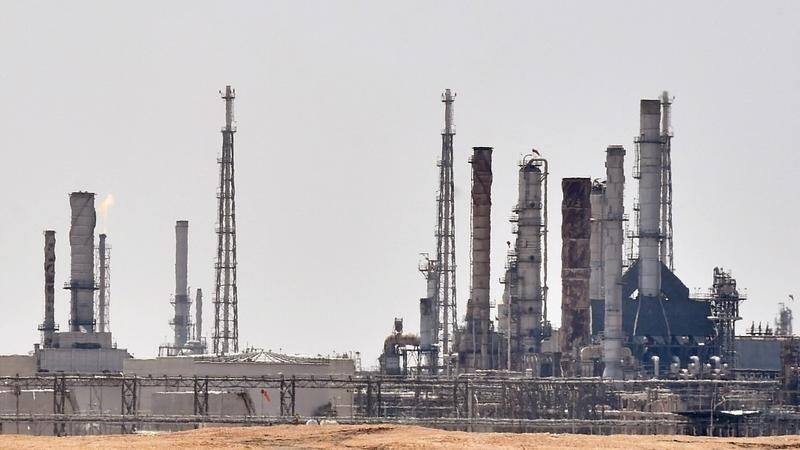 This file photo taken on Sept 15, 2019, shows an Aramco oil facility near al-Khurj area, just south of the Saudi capital Riyadh. (FAYEZ NURELDINE / AFP)
This file photo taken on Sept 15, 2019, shows an Aramco oil facility near al-Khurj area, just south of the Saudi capital Riyadh. (FAYEZ NURELDINE / AFP)
A lack of strategic coordination between developed countries and oil-producing countries when it comes to transitioning to greener energy sources is a key cause of under investment in oil and gas, experts say.
They also urged developed countries to adopt a more coordinated effort in managing the clean energy shift with oil-producing countries so that they do not end up indirectly financing the advanced countries’ energy transition.
In an interview with CNBC on Aug 17, newly appointed Organization of the Petroleum Exporting Countries Secretary General Haitham Al Ghais said it was not OPEC to blame for soaring inflation but “chronic under investment” in the oil and gas industry.
The problem with transitioning to clean energy is that there is no coordinated strategy on the level of oil producing countries and developed countries that want to transit fast to clean energy.
Rasha Al Joundy, Gulf expert and senior researcher at the Dubai Public Policy Research Centre in the United Arab Emirates
“The problem with transitioning to clean energy is that there is no coordinated strategy on the level of oil producing countries and developed countries that want to transit fast to clean energy,” Rasha Al Joundy, a Gulf expert and senior researcher at the Dubai Public Policy Research Centre in the United Arab Emirates, said.
ALSO READ: Used cooking oil fuels innovation
The researcher said there should be a gradual and mutually beneficial transition to clean energy that “does not harm the economy of either of the producing or the consuming countries”.
The price of oil has soared in 2022, coming close to an all-time high of $147 per barrel in March due to the Russia-Ukraine conflict, according to a report by Reuters.
A June report by the International Energy Agency said that global energy investment is set to increase by 8 percent in 2022, reaching $2.4 trillion. The report attributed this rise to money being pumped into clean energy.
Though encouraging, the report said, the growth was “far from enough” to address today’s energy crisis and pave the way towards a cleaner and more secure energy future.
Osama Rizvi, an energy and economic analyst at data monitor Primary Vision Network said that the idea of energy transitions and the problem of climate change “has not been defined well”.
“A sudden transition to renewables has led to under investment in fossil fuels without considering the fact that these alternative systems have inherent limitations let alone a flurry of other issues, such as intermittency and availability. The problem needs to be redefined and the narrative reframed,” said Rizvi.
In July, Mariam bint Mohammed Almheiri, the UAE minister of climate change and environment, underscored the need for a just transition to clean sources of energy “because every country is not at the same level”.
She said that transition was not like “flicking a switch” and that oil and gas “will still be part of the energy mix for some time”.
United States-led sanctions targeting Russia’s energy sector have prompted a spike in fuel costs in the US and Europe, leading to soaring inflation. This has forced the US and Europe to tap oil-rich countries like the UAE and Saudi Arabia, both OPEC members, to increase energy supplies.
READ MORE: Rich nations cheat the poor of fossil fuels
Nadim Farajalla, director of the Climate Change and Environment Program at the Issam Fares Institute for Public Policy and International Affairs at the American University of Beirut in Lebanon, said under investment is not the only issue.
“The problem is countries like Saudi Arabia and UAE are heavily reliant on oil and gas for their economy...so any shift away from that is going to cost them a lot. This shift has to be managed properly, everyone has to pitch in,” Farajalla said.
“Not only the producers of the oil and gas but also the users of the oil and gas and that is basically Europe, US, China, and India. There has to be a coordinated effort at managing this shift that would allow Saudi Arabia and other oil-producing countries to reinvent their economies and reinvest their oil and gas money into different sectors,” he added.
Farajalla said there are plenty of opportunities to help mitigate the impact of the shift away from oil and gas. He said the money and the infrastructure that they have can be transitioned into reliance on the plentiful sunshine available in the Gulf.
He also said investment and utilization of multi-use plastics and investment in technologies that allow the production of multi-use plastics is another area that the oil-dependent countries can explore.
“The onus is not only on the oil producers but on oil consumers as well. There has to be a balance. There has to be a mutual support here or else everybody will lose. If there is a win-lose situation, everybody loses. We have to aim for a win-win situation,” said Farajalla.
“It is clear that building a shared interest is the answer to a smooth and just transition,” said Al Joundy from the UAE.


